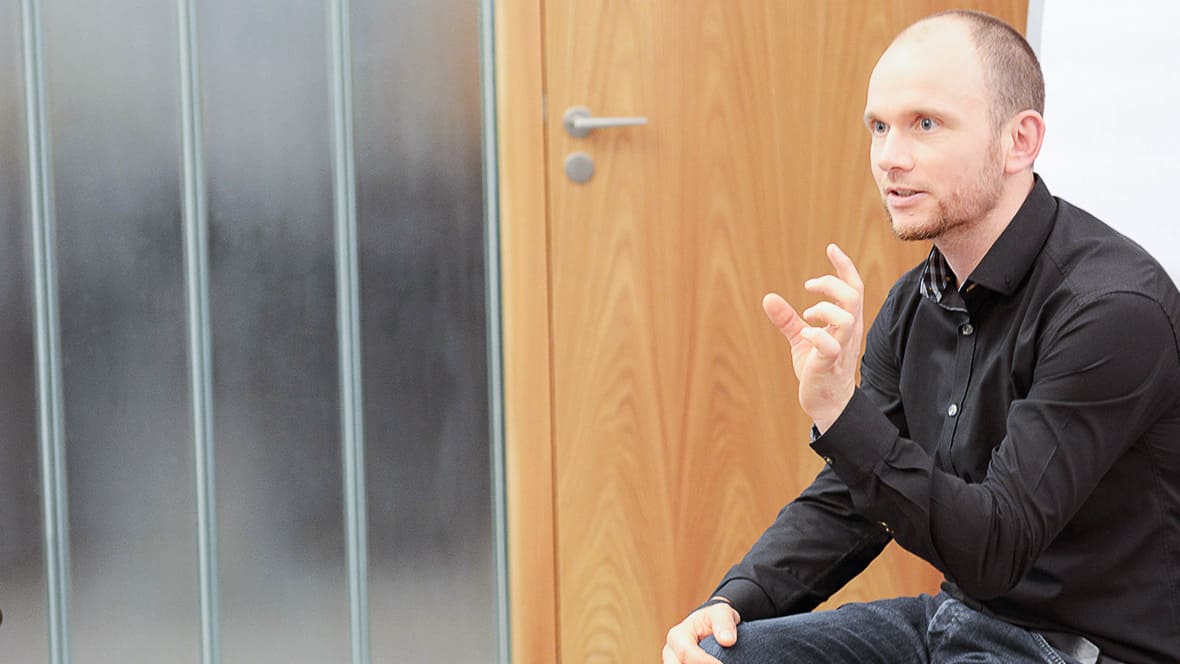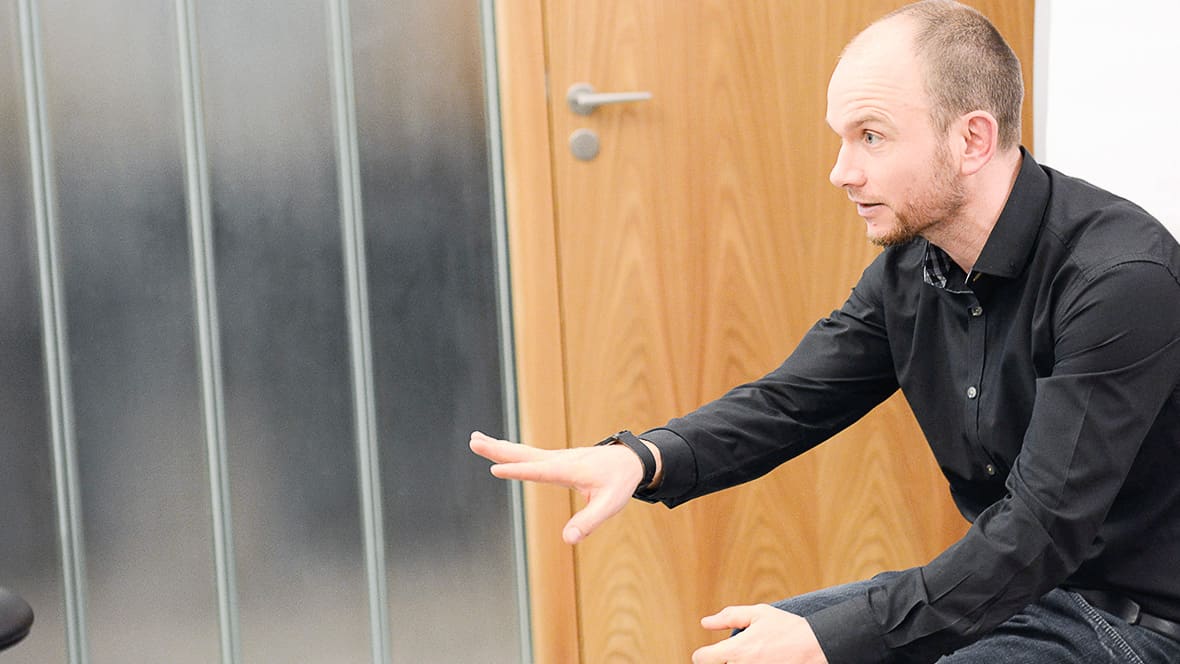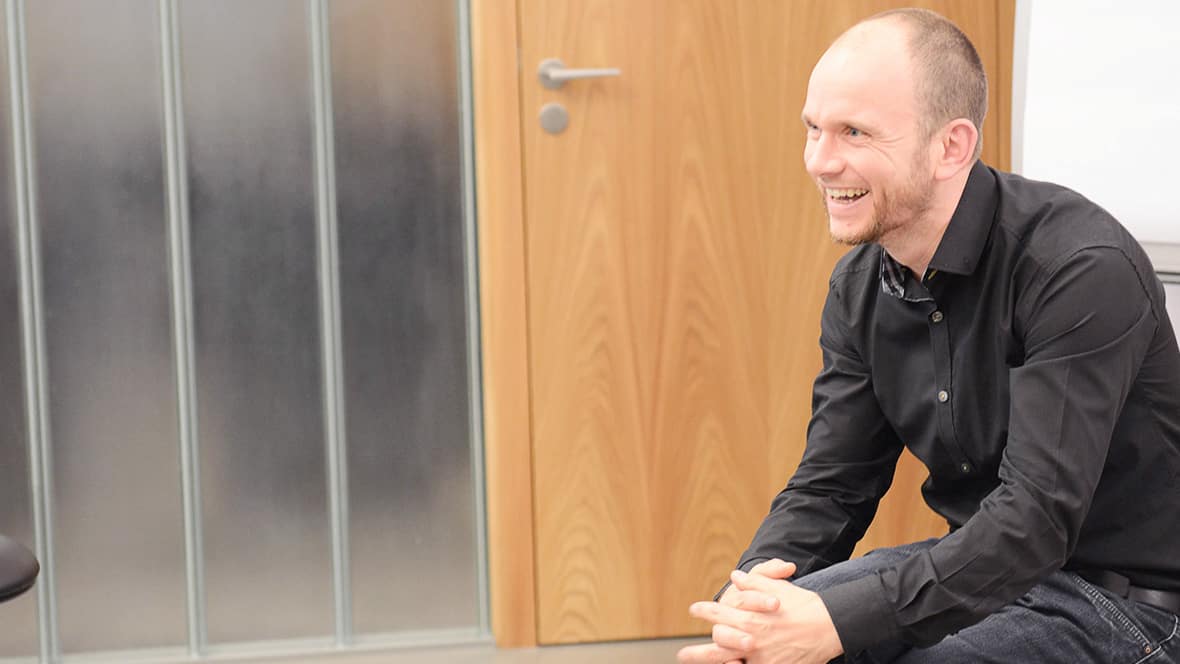


Consultant
„Change occurs when one becomes what he is.“ – Arnold R. Beisser
- Business-Consulting on innovation and strategy
- Consulting on projects
- Personnel and team development
- Moderation / Facilitation of sessions, off-site meetings and large group events
- Employee surveys and evaluations
- Coaching
- Keynotes and lectures
- Consultant, Business Coach, Facilitator, and Lecturer at artop (since 2013)
- Full-Professor for Organisational Theory and Human Resource Management at University of Applied Sciences Europe, Faculty of Management Studies (2014 – 2018)
- Full-Professor for Social and Health Psychology at Hochschule für Gesundheit & Sport (University of Applied Sciences) (2012 – 2014)
- Scientific assistant at Humboldt-University Berlin (2007 – 2013)
- Consultant, Business Coach, Facilitator, and Lecturer (2007 – 2013)
- PhD in Natural Sciences from Humboldt-University Berlin (2011)
- Certificate program in project management at IHK (2008)
- Certificate program in e-learning at Technical University Berlin (2008)
- Graduated psychologist (Diploma) from the Humboldt University of Berlin, Technical University Berlin and University of Port Elizabeth, South-Africa (2000 – 2006)
- Certificate program in communication- and training at University Potsdam (2005)
In German:
- Bedenk, S., Kunert, S., & Fietze, B. (2022). Der Faktor Zeit: Impulse für Coaching, Teamentwicklung und Organisationsberatung. Gr Interakt Org. DOI: 10.1007/s11612-022-00626-9
- Kunert, S. (2022). Online-Meetings: Fluch und Segen eines digitalen Kommunikationsformat. Organisationsberatung, Supervision, Coaching. DOI: 10.1007/s11613-022-00789-w
- Kunert, S. & Bedenk, S. (2021). Mehrebenen-Ansätze – Komplexe Projektarchitekturen in der Organisationsentwicklung. Organisationsberatung, Supervision, Coaching, 1-12. DOI: 10.1007/s11613-021-00704-9
- Kunert, S. & Dittmann, S. (2020). Die Bedeutung des Teamklimas in Relation zu Organisationskultur, Führungsrepertoire und Motivation. Organisationsberatung, Supervision, Coaching, 27(2), S. 169-183. DOI: 10.1007/s11613-020-00647-7
- Kunert, S. (2019). Open Innovation im Ideenmanagement. In: W. Scholl (Hrsg.). Mut zu Innovationen – Impulse aus Forschung, Beratung und Ausbildung. Berlin: Springer.
- Kunert, S. (2019). Innovationsprojektgestaltung. In: W. Scholl (Hrsg.). Mut zu Innovationen – Impulse aus Forschung, Beratung und Ausbildung. Berlin: Springer.
- Staar, H., Kania, H., Gurt, J. & Kunert, S. (2018).„Gekommen, um zu bleiben“ – eine Analyse des Zusammenhangs zwischen personen- und kontextbezogenen Faktoren und Studienerfolg in Studiengängen der öffentlichen Verwaltung. Gruppe Interaktion Organisation. Zeitschrift für Angewandte Organisationspsychologie, 49(3), 213–229. [Abstract]
- Kunert, S., Beyer, L., Staar, H. & Schepler, P. (2018). Von der Strahlkraft einer psychologischen Methodenlehre – eine Replik auf das Positionspapier zur Rolle der Psychologischen Methodenlehre in Forschung und Lehre von Meiser et al. (2018). Psychologische Rundschau, 69 (2).
- Nachtwei, J., Lohse-Bossenz, H., Weinert, S., Kunert, S., Grundei, J., Beyer, L., Krins, C., Monett, D., Koob, C., Ianiro-Dahm, P., Petry, T. Christandl, F., Thies, A., Israel, J.H., Kaiser, S., Schmitz, C., Kawohl, J., Beyer, R., Franke, T., Hackl., B., Fisch-er, S., Nieken, P., Binninger, F-M., Kolrep, H., Warneke, C., Prümper, J., Ripsas, S., Weber, P.J., Kanning, U., Salander, B., Onnasch, L., Wilbert, J., & Petersen, A-C. (2018). ProfPraef-Studie: Welche Attribute präferieren Studierende bei Profes-sor*innen? ResearchGate [Download]
- Nachtwei, J., Lohse-Bossenz, H., Weinert, S., Kunert, S. et al. (2018). Was Studierende von Professoren erwarten. Forschung & Lehre, 10, 878-879. [Download]
- Kunert, S. (2016). Lernförderliche Arbeitsgestaltung und Innovation. ABWF-Bulletin (1), S. 6-9. [Download]
- Kunert (2016). Das stumme Scheitern. In: S. Ringel (Hrsg.). Ein Knacks im Leben – Wir scheitern… und wie weiter? Bulletin des Voegele Kulturzentrums, 102. Pfäffikon (SZ): Stiftung Charles und Agnes Vögele, S. 24-25. [Download]
- Kunert, S. (2016). Kultur fördert Innovationen – Organisationsdiagnostik im Zeiten des New Work. Wirtschaftspsychologie aktuell (2), S. 55 – 57. [Abstract]
- Bedenk, S. & Kunert, S. (2016). Innovationsberatung – Ansätze für Veränderung und Neues. Organisationsberatung, Supervision, Coaching, 23, S. 255–267. [Download]
- Scholl, W. & Kunert, S. (2016). Interaktion als Grundlagenthema im Coaching. In: S. Greif, H. Möller & W. Scholl (Hrsg.). Handbuch Schlüsselkonzepte im Coaching. Heidelberg: Springer. [Abstract]
- Kunert, S. (2016). Scheitern in Organisationen. HR Consulting Review, 7, S. 31-35. [Download]
- Kunert, S. (Hrsg.) (2016). Failure Management: Ursachen und Folgen des Scheiterns. Springer Gabler. [Vorschau]
- Kunert, S. & Bedenk, S. (2015). 10 Mythen der Innovation. Ideen&Management (01), S. 11-13.
- Freitag, A., Kunert, S., Waack, K. und Tiede, A. (2015). Passungsmaße als Prädiktor in Zusammenhangsanalysen. ZeE-Publikationen. Reihe Empirische Evaluationsmethoden, Band 19, S. 5-13.
- Kunert, S. (2015). Notwendigkeit und Umsetzungsformen von Evaluation psychologischer Dienstleistungen. ZeE-Publikationen. Reihe wissenschaftliche Veranstaltungen, Band 5, S. 85-90.
- Kunert, S., Ernst, I., Bedenk S. & Tirre, S. (2015). Wissenschaftlich gestützte Organisationsberatung – Verortung eines Paradigmas – Ein Werkstattbericht. Wirtschaftspsychologie (2), S. 84-90.
- Scholl, W. & Kunert, S. (2014). Teamentwicklung – wie ein gutes Team entsteht. RKW-Magazin (3), S. 28-31. [Download]
- Scholl, W., Schmelzer, F., Kunert, S., Bedenk, S., Hüttner, J., Pullen, J. & Tirre, S. (2014). Mut zu Innovationen – Impulse aus Forschung, Beratung und Ausbildung. Berlin: Springer. [Vorschau]
- Kunert, S. (2014). Health Change Management – gesundheitsorientierten Wandel gestalten. In: J. Zinner, M. Elbe & D. Lange (Hrsg.). Handbuch Gesundheitscoaching. Berlin: Hochschule für Gesundheit & Sport, Technik & Kunst, S. 135-149.
- Tirre, S. & Kunert, S. (2014). Trainingsevaluation in der Praxis – Konzeption & Evaluation eines wissenschaftlich gestützten Ansatzes. ZeE-Publikationen. Reihe Empirische Evaluationsmethoden, Band 18, S. 17-30.
- Peters, S., Elbe, M. & Kunert, S. (2014). Anreizkompetenz als Form der reflexiven Professionsentwicklung in differenziellen Personalstrukturen. In: M. Schwarz, P. Weber & K. Feistel (Hrsg.). Professionalität: Wissen – Kontext. Sozialwissenschaftliche Analysen und pädagogische Reflexionen zur Struktur bildenden und beratenden Handelns. Bad Heilbrunn: Klinkhardt, S. 674 – 690.
- Kunert, S. & Bedenk, S. (2013). Die Professionalisierung der Organisationsberatung und die Rolle der Wissenschaft. Organisationsberatung, Supervision, Coaching, 20 (1), S. 17-22. [Abstract]
- Bedenk, S., Kunert, S. & Scholl, W. (2013). Fähigkeit zur Veränderung fördern. IO Management (1), S. 21-25.
- Bedenk, S., Kunert, S., Scholl, W. & Tirre, S. (2013). GI:VE and take zwischen Wissenschaft und Praxis – Survey-Feedback-Prozesse als Maßnahmen einer wissenschaftlich gestützten Organisationsberatung. Wissenschaftsmanagement, 19 (4), S. 34-37. [Download]
- Kunert, S. & Spittler, S. (2013). Die Entwicklung eines Klassifikationssystems der arbeits- und organisationspsychologischen Methoden. ZeE-Publikationen. Reihe Empirische Evaluationsmethoden, Band 17, S. 35-50.
- Schmelzer, F. & Kunert, S. (2013). Fallstudie Advoservice: Erklärungen oder Verklärungen. In: G. Becke, C. Funken, S. Klinke, W. Scholl & M. Schweer (Hrsg.), Innovationsfähigkeit durch Vertrauensgestaltung? Befunde und Instrumente zur nachhaltigen Organisations- und Netzwerkentwicklung. Frankfurt/M.: Lang, S. 43-51.
- Kunert, S., Rudinger, G., Tirre, S. & Bedenk, S. (2013). Innovationspromotoren – Möglichkeiten und Grenzen einer individualisierten Förderung von Innovationsprozessen. Ideenmanagement, 38(4), S. 107-109. [Download]
- Kunert, S. & Bedenk, S. (2012). Die Wissenschaft als Wegweiser zur Professionalisierung der Organisationsberatung. Wirtschaftspsychologie (4), S. 17-19.
- Kunert, S., Fechner, D. & Lemmer, J. (2012). Die Neuentwicklung eines Kompetenzmodells für bildungsbenachteiligte Arbeitnehmergruppen. Zeitschrift für Gesundheit & Sport. (2), S. 6-24.
- Scholl, W., Bedenk, S., Kunert, S. & Rauterberg, H. (2012). Was macht Innovationsvorhaben erfolgreich? Empirische Befunde und Implikationen für die Praxis. Humboldt-Spektrum, (1) 20-25.
- Kunert, S. (2011). Wirkungsanalyse kognitiver Lernwerkzeuge. Dissertation. Berlin: Humboldt-Universität [Download]
- Scholl, W. & Kunert, S. (2011). Mode oder Methode? Die Bedeutung von Vertrauen für Innovationsprozesse. præview (04), S. 18-19. [Download]
- Scholl, W. & Kunert, S. (2009). Das Modell einer strategisch-kompetenzbasierten Personalentwicklung. In T. Neumann. PEsystem Personalentwicklung mit System – Strategische Personal- und Kompetenzentwicklung im Unternehmen. Berlin: RKW Berlin, S. 35-39. [Download]
- Kunert, S. (2008). Wirkungsanalyse eines kognitiven Lernwerkzeugs – Quantifizierung von Unterschieden in Effektgrößen mittels zweifaktorieller ANOVA. ZeE-Publikationen. Reihe Empirische Evaluationsmethoden, Band 12, S. 57-62.
- Kunert, S. (2006). Wirkungsanalyse eines kognitiven Lernwerkzeuges. Diplomarbeit. Berlin: Humboldt-Universität. [Download]
In English:
- Kunert, S. (Ed.) (2018). Strategies in Failure Management – scientific insights, case studies and tools. Heidelberg: Springer.
- Kunert, S., Alexander, A., Berthod, O., Salge, O. & Washington, A. (2015). Failure-driven Innovation. Berlin: artop. [Download]
- Kunert, S. (2009). Value Contribution of Human Resource Management. ZeE-Publikationen. Reihe Empirische Evaluationsmethoden, Band 13, pp. 69-73.
Latest Articles
artop Programme 2022
Our English programme 2022 is here! It provides an overview of our consulting, academy and research services. Enjoy reading and discovering!
Review Colloquium: Culture Eats Strategy (and Leadership) for Breakfast
Many thanks to Dr. Sebastian Kunert, who gave an insight into his research project during the last artop colloquium.
artop-Colloquium: Culture Eats Strategy (and Leadership) for Breakfast
On June 12, Dr. Sebastian Kunert (consultant at artop) and Emily Buber, PhD student at Humboldt-University Berlin, show new results from their research. For several years, they applied a survey study to reveal links between four levels: organizational culture, leadership style, team climate, and employee motivation.
The link between organisational environment and organizational culture
In a recent conference paper, we examine the connection of organizational environment characteristics and corporate culture facets. It is based on our research with the modular inventory for organizational research modul_or and applied on the concept of uncertainty. Results show that organisations from rather dynamic business domains with higher demands of uncertainty are different to ones coming from rather stable, more predictable environments.
New publication: Strategies in Failure Management
In a few weeks the time has come: the book Strategies in Failure Management by artop consultant Dr. Sebastian Kunert published. The volume includes a number of authors and topics, is published in …
Innovation consulting: Possible approaches towards change and innovation
In this paper we argue that a systematic organisational consulting approach can be supportive in fostering innovation and change processes in companies.
modul_or: Presentation of current research results at the ISPM in Vienna
Abstract The well known Peter Drucker quote “Culture eats strategy for breakfast“ is widely accepted but, in fact, rarely tested. Dr. Sebastian Kunert and a colleague presented new findings based …
Motivation in Innovation Projects
In the innovation process literature stage gate models on the one hand and context factors on the other are still dominant. Very little is known about special issues regarding innovation …
Contact
Programmes & Trainings in English
Leading Change
Designing and Facilitating Effective Meetings
Systemic Coaching
Failure Management

Valuable insight into the unexplored field of dealing with setbacks, unsuccessfulness, and defeats in management. (written in German language)
